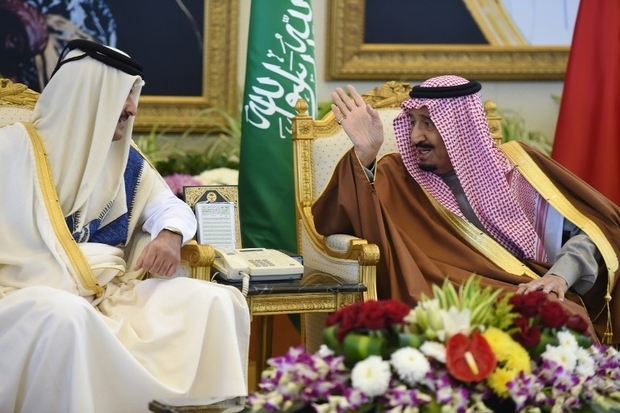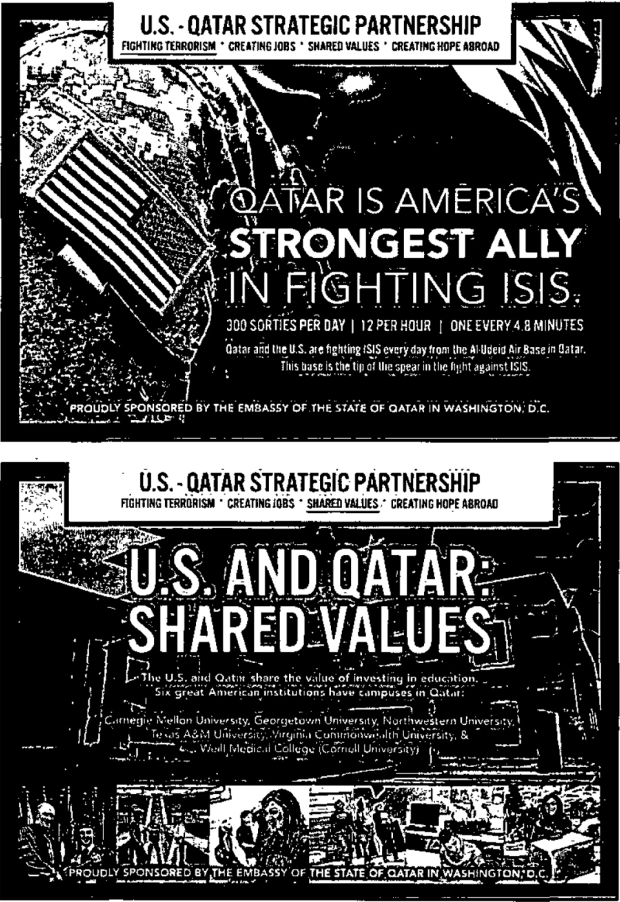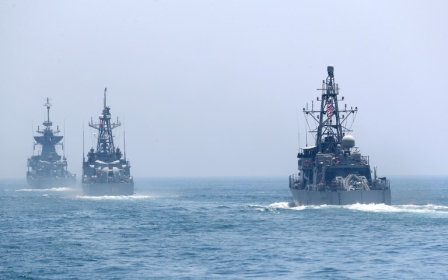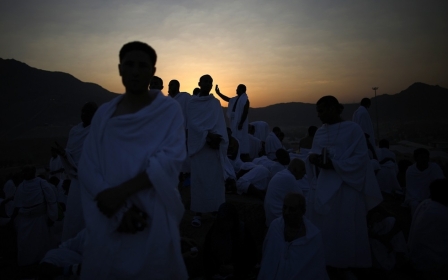Gulf diplomatic war with Qatar opens front in US media

NEW YORK, United States – A new word is making the rounds in Washington: Qatarism.
The term was hatched by Saudi Arabia-funded publicists in the US capital in a bid to swing decision-makers against what they depict as a reckless, extremist-backing neighbour in Qatar.
Doha is not taking this lying down. It has started spending millions on ads, lobbyists and lawyers to persuade Beltway insiders that Qatar is a stand-up ally and an innocent victim of slurs from the Saudis, Emiratis and others.
Each side in this two-month-old diplomatic ruckus appears to believe in the merits of spending petrodollars to sway a US government that is split between President Donald Trump, who has denounced Qatar, and some of his top aides who have sought to diffuse Gulf tensions.
Analysts, meanwhile, are divided over whether Riyadh’s initiative is fizzling out, or if deep Saudi pockets will ultimately win over enough American bigwigs to render Doha diplomatically isolated and exposed to their demands.
Sigurd Neubauer, a Washington-based Gulf expert, has seen the gritty ads linking Qatar with silhouette images of al-Qaeda militants, as well as Doha’s counter-propaganda, and says both sides are frittering cash on old rope.
“For Beltway insiders who are fluent in GCC lingo, this is clearly a longstanding dispute that is best avoided. Some people are more sympathetic to the Saudi side, but this PR battle is just noise that’s not changing anybody’s mind,” Neubauer told Middle East Eye.
Propaganda war in Washington
On 5 June, a Saudi-led bloc, which includes the United Arab Emirates, Bahrain and Egypt, cut ties with Qatar, accusing it of backing militants and cosying up to regional bogeyman Iran – allegations Doha denies.
Western-backed Kuwaiti mediation has failed to end the dispute, in which the four states have travel and communications with Qatar, demanding that it curtail support for the Muslim Brotherhood and shutter the Al Jazeera media channel, among other steps.
An initial list of 13 demands also urged Qatar to stop funding MEE, though this link was rejected by editors of the London-based news website.
Some people are more sympathetic to the Saudi side, but this PR battle is just noise that’s not changing anybody’s mind
- Sigurd Neubauer, Gulf expert
At the start of the crisis, Trump appeared to fall in behind Riyadh when he branded Qatar a “funder of terrorism”. Within days, however, Qatar was buoyed by Defence Secretary Jim Mattis’ decision to complete a $12bn deal to sell F-15 fighter jets to Doha.
Last month, US Secretary of State Rex Tillerson inked a deal with Qatar on fighting terrorism and its financing, which was widely viewed as a diplomatic leg-up for an isolated country that hosts America’s al-Udeid Air Base – a launch pad for bombing the Islamic State (IS) group.
Since then, the propaganda war has come to Washington.
The Saudis have long-established public relations machinery in the US, which has most recently been deployed, unsuccessfully, to derail a 2016 US law that allows Americans to sue Riyadh over its role in the 9/11 attacks.
Last month, the Saudi American Public Relation Affairs Committee (SAPRAC) reportedly spent $138,000 on seven 30-second television adverts on NBC-4 in Washington that accuse Qatar of supporting “terrorism” and destabilising US allies in the region.
The low frequency of the ads, together with their timing – during the weekly news show Meet the Press and the British Open golf tournament – indicated they were aimed at Beltway wonks and lawmakers rather than white-bread Americans.
SAPRAC, which touts an anti-Qatar line on social media, did not respond to MEE’s interview requests.
Mudslinging
Saudi publicists also coined the phrase Qatarism. An online documentary bearing that name describes a “two-faced world” in which Qatari royals buddy up to Uncle Sam while secretly funding Hamas, al-Qaeda and other US foes.
Gulf-backed think-tanks are also involved. The private Saudi-funded Arabia Foundation addresses Qatar’s “subversive” foreign policy, while the UAE-backed Arab Gulf States Institute in Washington has run events on staunching terror cash flows in the Gulf.
Qatar, meanwhile, has taken online ads in US newspapers, selling itself as Washington’s “strongest ally” against IS and making the Trump-friendly claim that it will lavish $45bn on the US over five years and underpin 60,000 American jobs.
An advertising truck, bearing the slogan “lift the blockade against the people of Qatar” has been seen driving around the capital, referring to sanctions that have left Doha relying on imports via Turkey, Iran and Oman.
Qatar has recently inked deals with an array of Washington lawyers and lobbyists to burnish its credentials, including a $40,000-a-month deal with McDermott Will & Emery and a $2.5m retainer with Ashcroft Law Firm.
It also signed a $150,000-a-month deal with Avenue Strategies Global, a lobbying firm co-founded by Trump’s former campaign manager, Corey Lewandowski, and another former Trump campaign hand, Barry Bennett.
“Various neighbouring countries have spent millions on ads, PR, and lobbying in an effort to drive a wedge between Qatar and the US,” a Qatar government spokesman told MEE.
“The ads we’re running and the communications efforts we’ve made are a modest effort to counter their smear campaign with facts.”
'Zero impact'
Analysts contacted by MEE offered various theories of how the Gulf info-war would play out, but all agreed that media spin was less effective than the face-to-face meets with decision-makers that lobbyists can provide.
“These campaigns have zero impact. It’s just another way for smart Americans and Londoners to make money in contracts with unsophisticated Arab zillionaires who think that ads on buses will change US government policy,” Beirut-based analyst Rami Khouri told MEE.
“We always knew the Saudis and Emiratis were incompetent at public diplomacy, but now they’re counterproductively hurting themselves by shredding any last vestige of credibility their press had by turning their media into attack dogs.”
These campaigns have zero impact. It’s just another way for smart Americans and Londoners to make money in contracts with unsophisticated Arab zillionaires
- Rami Khouri, analyst
For Neubauer, the net effect of the spat is positive. Qatar is no different from other Gulf states when it comes to dirty cash and militants. As all players wash their dirty linens in public, illicit Gulf cash flows to hardliners will become harder to justify, he said.
Ali al-Ahmed, a Saudi sceptic who runs the Washington-based Institute for Gulf Affairs, sees darker hands at work. The anti-Qatar smear campaign echoes the yarns about mass-casualty weapons trotted out before the 2003 US-led invasion of Iraq, he told MEE.
The Trump administration is using a “deliberate American tactic” of cajoling petrodollars out of Doha, Riyadh and others, but will ultimately give Saudi a green light once Trump gets his asking price, he said.
“In Washington, people lie. They promise you the sky and sun and take your money, but this decision ultimately rests with the president of the United States; he decides what happens. And the Saudis and Emiratis have him in their corner,” al-Ahmed told MEE.
New MEE newsletter: Jerusalem Dispatch
Sign up to get the latest insights and analysis on Israel-Palestine, alongside Turkey Unpacked and other MEE newsletters
Middle East Eye delivers independent and unrivalled coverage and analysis of the Middle East, North Africa and beyond. To learn more about republishing this content and the associated fees, please fill out this form. More about MEE can be found here.





